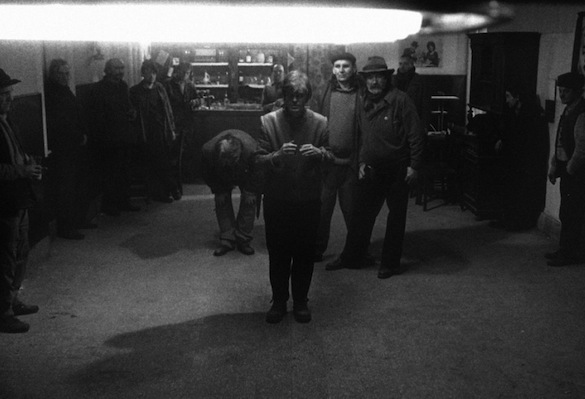
“There is a whole history of idiocy as a figure apt to blur the game of explanations and strategies. Of course Dostoyevsky comes to mind and there is something of Myshkin in the Valuska of Wreckmeister Harmonies. Dostoyevsky constructed the figure of the idiot as an antidote to the progressivist-socialist view of history that he saw emerging. In contrast to Béla Tarr, who arrived after the historical sequence of ‘real socialism’, he sought in the figure of the idiot to preserve a figure of refusal, to save it from the disaster of the system. The question that traverses Béla Tarr films and is emblematized in these figures of idiocy is to know whether one draws from the communist failure a simple lesson of the nihilist equivalence of everything with everything else or whether one extracts figures of refusal out of nihilism. What appeared clearly at the time of the collapse of the Soviet Bloc is that the supposed ‘ideological cement’ linking individuals to a system of domination was nothing other than people consenting to pay lip service to the official lie. Against this consent to the lie, Béla Tarr sets figures of idiocy that do not accept that the promise of words is only consent to lying and the madman that does not renounce the promise of harmony present in the celestial system. This attitude can be defined as proto-political, in the sense that through their stubbornness these characters radicalize a decision prior to all political action – the decision to verify through one’s own actions that not everything is a lie. But it scarcely makes sense to oppose this ‘stupid’ stubbornness to the intelligence of a strategic aim. Only things that actually stand opposed really ought to be set against one another. And the complement that Valuska lacks that would allow a real political subject to emerge is not some strategic aim. All that he stands opposed to is general cowardice and petty individual arrangements.”
“If we leave the context of Béla Tarr’s films, we come across an analogy in the arguments used by strategists of anticapitalist combat against the ‘indignant’, who are ‘without project’. The problem is that these strategists don’t have any project either. What they do have is imply the ability to explain endlessly that a project is required. The opposition is in fact an opposition between two sorts of obstinacy: the obstinacy to turn around in the circle of explanation, which is part and parcel of the consensus: and the obstinacy to mark a distance that at least conserves the possibility of dissensus.”
– Jacques Rancière in conversation with Oliver Davis, 2013

“The police are not the law that interpellates the individual (the “hey, you there” of Louis Althusser) unless we confuse the law with religious subjection. The police are above all a certitude about what is there, or rather, about what is not there: “Move along, there’s nothing to see.” The police say there is nothing to see, nothing happening, nothing to be done but to keep moving, circulating; they say that the space of circulation is nothing but the space of circulation. Politics consists in transforming that space of circulation into the space of the manifestation of a subject: be it the people, workers, citizens. It consists in refiguring that space, what there is to do there, what there is to see, or to name. It is a dispute about the division of what is perceptible to the senses.”
– Jacques Rancière, Aux bords du politique (1998)
“We would do better to ask what is a subjective or implicit presupposition: it has the form of ‘Everybody knows .. .’. Everybody knows, in a pre philosophical and pre-conceptual manner … everybody knows what it means to think and to be. … As a result, when the philosopher says ‘I think therefore I am’, he can assume that the universality of his premisses – namely, what it means to be and to think … – will be implicitly understood, and that no one can deny that to doubt is to think, and to think is to be …. Everybody knows, no one can deny, is the form of representation and the discourse of the representative. When philosophy rests its beginning upon such implicit or subjective presuppositions, it can claim innocence, since it has kept nothing back – except, of course, the essential – namely, the form of this discourse. It then opposes the ‘idiot’ to the pedant, Eudoxus to Epistemon, good will to the overfull understanding, the individual man endowed only with his natural capacity for thought to the man perverted by the generalities of his time. The philosopher takes the side of the idiot as though of a man without presuppositions.
(…) At the risk of playing the idiot, do so in the Russian manner: that of an underground man who recognises himself no more in the subjective presuppositions of a natural capacity for thought than in the objective presuppositions of a culture of the times, and lacks the compass with which to make a circle.”
– Gilles Deleuze, Difference and repetition (1968)